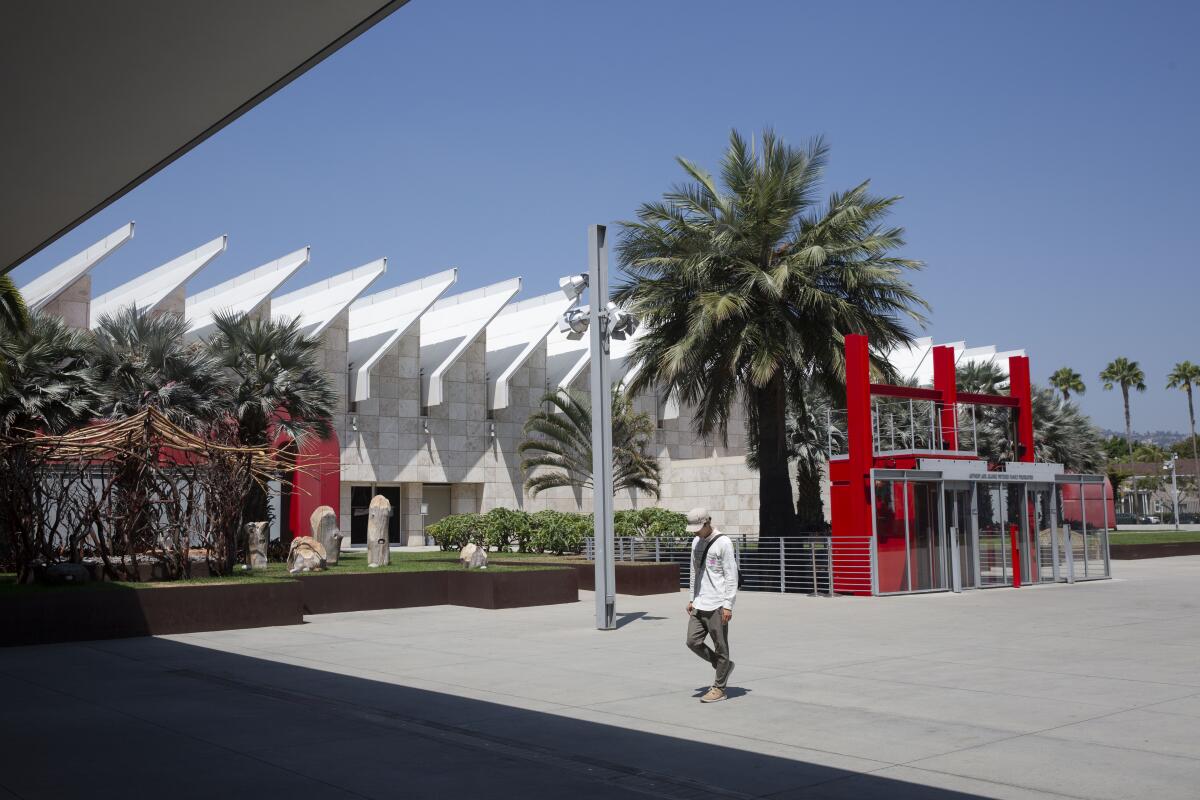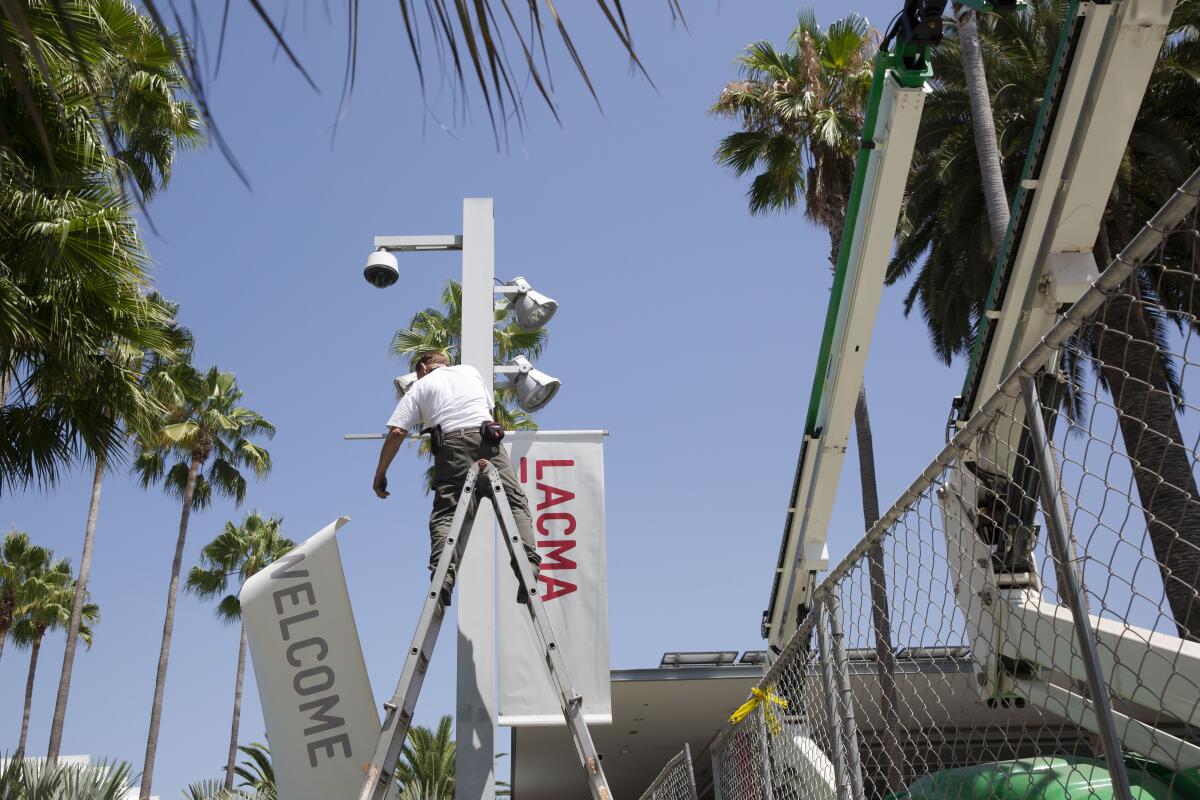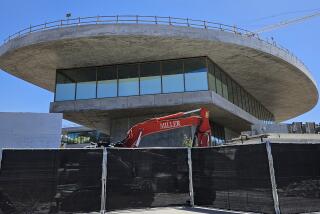Column: LACMA, largely closed, has become an expensive ghost town

- Share via
My family recently took a few of my son’s friends, visiting Los Angeles for the first time, to the Los Angeles County Museum of Art. You know, our big museum with its encyclopedic collection. The one that’s right next to the La Brea Tar Pits, from which visitors are tempted by a series of banners proclaiming that “LACMA is open.”
Banners that should read “LACMA is open, sort of.” Or “LACMA is open, if you only want to see visiting exhibits and virtually none of the permanent collection.”
For the record:
2:39 p.m. Aug. 27, 2019This column mentions pony rides as having been offered at Fairfax Avenue. They were offered in Beverly Park at La Cienega and Beverly boulevards.
California is famous for its ghost towns, but you don’t expect to find one where L.A.’s major art museum once was. Or pay up to 25 bucks to see it.
My husband and I knew LACMA was prepping for the creation of its new and controversial building, and we figured that some of the collection would be packed away. But as the ticket kiosk displayed the same pricing and no signage warned about a drastic reduction in accessible art, we paid with the blithe assumption that there would still be lots to show off to our guests. My husband even renewed his long-held dual membership with, again, no comment from the museum employee about any major decrease in what that $130 would get him.
Which is two buildings of gallery exhibitions and virtually none of the permanent collection.
Perhaps we should have been tipped off by the lack of museum maps; instead we were directed to a stack of white slips of paper that list those visiting exhibitions. Oh, and on the back, in very small type, all the things that were closed, something we missed as we headed through the Ahmanson building into the main courtyard.
Wandering into that empty silence, we consulted our slip of paper and discovered that the list of closures included the Art of the Americas building, the Hammer building, the Pavilion for Japanese Art, the Bing Theater and most of the Ahmanson.
The only part of the permanent collection that was available was a small exhibition of modern art on the second floor of the Ahmanson. The scattering of Picasso, Klee and other works that could keep you occupied for a half-hour, tops.
The air conditioning, however, is still functional, as are the restrooms, so I guess that’s something. There’s also a whole room devoted to the evolution of the museum, complete with a mock-up of the new design, and another room filled with crates.
All was not lost, of course. Across the courtyard, where the membership sales tables were fully operational, there was plenty of contemporary art to view in the BCAM building, including “Mary Corse: A Survey in Light” and “The Allure of Matter: Material Art From China,” and in the Resnick Pavilion. Chris Burden’s “Urban Light” continues to provide an iconic selfie-station, as does the B. Gerald Cantor Sculpture Garden, though it is closing in November.
So LACMA is still open, just not open in the encyclopedic art museum sense, which made it a bit embarrassing to show to out-of-towners and just plain sad for the rest of us.

I’ve never been a huge fan of nostalgia — loving mentions of the pony rides at Fairfax or those legendary orange groves bring on the dry heaves. Let other cities proudly display their monuments to calcification; Los Angeles shifts and changes like the living city it is.
Still, standing in the empty glare between the Art of the Americas and the Hammer, fully expecting a tumbleweed to skitter by, it was tough not to feel sad.
As no doubt is true for many Angelenos, these buildings have been part of my life for many years. My husband and I had our first real date at one of LACMA’s courtyard concerts. I brought my parents, now long gone, here, and my kids from the time they were infants. (Art museums are a favorite outing for new parents, which is odd given the silence factor, but there are benches and AC and the illusion that just maybe life as we know it is not truly over.)
This wallowing, however, quickly turned to irritation and not just because it’s embarrassing to bring guests to a museum that perhaps we should have known was mostly closed. Yet not only were no “extreme closures” indicated at the ticket window, but the website was also fairly mum on the subject. You have to go to the “Know Before You Go” tab and then scroll down past all the gallery updates before you come to the bland “oh, by the way” list of closures.
And, it must be repeated, the daily visit still costs the same (disclosure: I have a press pass), as does the membership. After dropping $130 only to find a museum that is already drastically reduced and will get only smaller over the next year, my husband was ready to ask for his money back.
In the end he didn’t; because we have loved the museum for so long, we will continue to support it.
And that appears to be what LACMA is hoping for.
“We’ve always tried to keep our membership prices attractive,” LACMA Director Michael Govan said in an email. “After all we see our membership program as a way many people can be philanthropic and support LACMA’s work with their membership. And we need that support more than ever.”
Govan said that, through programs including NexGen (kids under 18 can become a member and get free admission for themselves and an adult) and free admission to L.A. County residents after 3 p.m. on weekdays, half of the museum’s annual visitors pay nothing at all.
Throughout the next five years, he said, LACMA plans to have six to 12 exhibitions annually, adding that “we know that most of our visitors don’t spend enough time in a visit to LACMA to see more than the many galleries that we have open now.”
Which is true, but not the point of an encyclopedic museum.
That the change costs money and staff needs to be paid and there are ways to visit LACMA for free are also true. But nothing changes the fact that many people coming to LACMA, sent by travel guides, bringing visiting relatives or just deciding it’s time for a little art, may not be aware of those changes, and there is no indication or explanation on the campus.
This is not a good look in a city that attracts millions of tourists every year. It’s also not the ideal way to transition to a controversial new building and a less-is-more philosophy that many, including The Times’ art critic, feel will diminish the collection even after it’s finished.
Obviously, LACMA needs to charge admission; it isn’t vanishing off the face of the Earth for the next five years before the new space opens, and the galleries do and will feature a wide variety of important art. But how about a discount? Or a “pay once, come twice” so you get admission to more than one set of visiting exhibitions? Or partner with the La Brea Tar Pits museum during the years that so much of LACMA will be closed. Rolling down the hill beside the museum and climbing on the giant sloths are still one of the great pleasures of an L.A. childhood.
At the very least, there should be a little more transparency for the permanent-collection-loving public. In the same email response, Govan said LACMA would “work to improve our messaging.” That would help a lot; “oh, did we forget to mention?” is never a great business plan, especially when the gift shop is still open and parking remains 18 bucks.
As for sustaining membership during those construction years, what about the above-mentioned transparency and incentive? Not everyone is as dedicated to the institution as my husband, so if you want people to pay the same for significantly less, at least throw in a LACMA Hydro Flask or a really good tote bag. Better yet, offer some sort of discount for the new museum once it opens.
But blaring signs saying “LACMA is open” is just false advertising. Much of it isn’t. So for heaven’s sake, just say so.
Dear Peter Zumthor, We haven’t met, but I have been following your work on a design for a new building at the Los Angeles County Museum of Art ever since word leaked (13 years ago) that you had been tapped for the project.
More to Read
The biggest entertainment stories
Get our big stories about Hollywood, film, television, music, arts, culture and more right in your inbox as soon as they publish.
You may occasionally receive promotional content from the Los Angeles Times.











